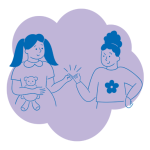
Get in touch
To speak to someone about this information, contact our physical health team.
Phone: 0191 333 3584
What is a urinary tract infection (UTI)?
A urinary tract infection (UTI) is a term used for an infection that can affect the bladder, kidneys and the tubes connected to them.
Anyone can get a UTI and they can be common in children (particularly girls).
A UTI can be painful and uncomfortable but is usually not serious and will begin to get better within a few days. However, some UTIs can require antibiotic treatment.
Those who suffer from recurrent UTIs may also need further specialist advice or treatment. If you have had two or more UTIs in six months or your UTI comes back after treatment, please seek medical advice.
Causes of UTI?
Most UTI’s are caused by bacteria that lives naturally inside a person’s guts, accidently getting into the persons bladder or urinary tract.
This can occur when:
- wiping your bottom and the soiled paper meets the genitals
- babies getting small particles of faeces (poo) in their (urethra) bladder tube when they have soiled their nappy
The following things can also increase the risk of UTI:
- constipation
- dysfunctional elimination syndrome (condition where children hold onto their pee)
- vesicoureteral reflux (a condition where urine leaks back into the ureters and kidneys due to a problem with the valves in the ureters)
- not drinking enough fluids (ideally water)
Signs and symptoms of a UTI?
If you have a UTI, you may have some of the following symptoms:
- pain or a burning sensation when passing urine
- needing to pee more often than usual
- pee looks cloudy, dark or has a strong smell
- needing to pee suddenly or more urgently than usual
- blood in your pee
- pain in your back, lower tummy or just under the ribs
- high temperature or feeling hot and shivery
- not gaining weight
- sickness
- feeling generally unwell
- deliberately holding onto you pee
- have changes in your normal toileting habits such as wetting yourself or the bed
- unpleasant smelling pee
- in very young children, yellowing of the skin and whites of the eyes (jaundice)
How is a UTI treated?
A doctor or physical healthcare nurse on the ward will ask you a few questions about your symptoms. They may also need to examine you and you may be asked to provide a urine (pee) sample to be tested.
Most UTIs in children are not serious and clear up after a short course of antibiotic treatment and do not cause any long-term problems.
If antibiotics are needed, they will be prescribed for you. You must make sure you complete the course and continue taking the antibiotics you have been given, even if your symptoms have got better.
You may need to also take pain relieving medication that will be prescribed if you are in hospital. You should drink plenty of fluids (especially water) to keep yourself hydrated.
For most children a UTI will clear within 24-48 hours of treatment.
Children with more severe symptoms and babies under 3 months old, are usually admitted to an acute hospital for closer monitoring and treatment.
You can help to prevent a UTI by following these do’s and don’ts:
Do
- wipe from front to back when you go to the toilet
- keep your genital area clean
- drink plenty of fluids, particularly water
- change nappies/incontinence pads as soon as possible when soiled
- wash your hands after using the toilet
Don’t
- use scented soap
- hold your pee in if you feel the urge to go
- rush while peeing- try to empty your bladder
- wear tight, synthetic underwear
- have lots of sugary food or drinks – this can encourage bacteria to grow
Where can I get further information?
During your hospital stay if you require further information, please ask the ward staff or the infection prevention and control team.
L1181, v1 24/05/2023 (archive 24/05/26)